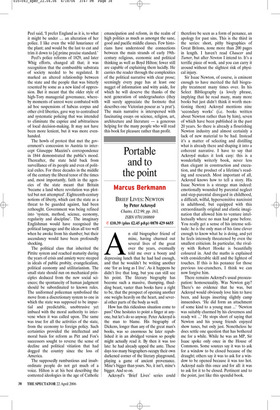Portable and to the point
Marcus Berkmann
BRIEF LIVES: NEWTON by Peter Ackroyd Chatto, £12.99, pp. 163, ISBN 0701169869 ✆ £10.39 (plus £2.45 p&p) 0870 429 6655 An old biographer friend of mine, having churned out several lives of the great over the years, eventually told me over a boozy and depressing lunch that he had had enough, and that he wouldn’t be writing another one ‘for as long as I live’. As it happens he didn’t live that long, but you can still see his point. The literary biography has become such a massive, thumping, thudding beast, vaster than books have a right to be, that the prospect of opening another one weighs heavily on the heart, and several other parts of the body as well.
How has this ridiculous situation come to pass? One hesitates to point a finger at anyone, but let’s do so anyway. Peter Ackroyd is the man to blame. His biography of Dickens, longer than any of the great man’s books, was so enormous he later republished it in an abridged version so people might actually read it. By then it was too late: he had already upped the ante. These days too many biographers occupy their own darkened corner of the literary playground, playing a game of ancient provenance. Mine’s bigger than yours. No, it isn’t, mine’s bigger. And so on.
Ackroyd’s ‘Brief Lives’ series could therefore be seen as a form of penance, an apology for past sins. This is the third in the series: short, pithy biographies of Great Britons, none more than 200 pages in length. I haven’t read Chaucer and Turner, but after Newton I intend to. It’s a terrific piece of work, and you can carry it around without the slightest risk of physical injury.
Sir Isaac Newton, of course, is eminent enough to have merited the full biography treatment many times over. In his Select Bibliography (a lovely phrase, implying that he read many, many more books but just didn’t think it worth mentioning them) Ackroyd mentions nine ‘secondary works’ (i.e. books written about Newton rather than by him), seven of which have been published in the past 20 years. So there is already a flourishing Newton industry and almost certainly a lack of new material to be had. Instead it’s a matter of selecting and distilling what is already there and shaping it into a coherent narrative. I have to say that Ackroyd makes it look easy: this is a wonderfully writerly book, never less than elegant in construction and execution, and the product of a lifetime’s reading and research. Most important of all, Ackroyd knows how to tell a story. His Isaac Newton is a strange man indeed: emotionally wounded by parental neglect and step-parental disregard in childhood, a difficult, wilful, hypersensitive narcissist in adulthood, but equipped with this extraordinarily original and elastic imagination that allowed him to venture intellectually where no man had gone before. You really get a sense of his intense solitude: he is the only man of his time clever enough to know what he is doing, and yet he feels intensely threatened by even the smallest criticism. In particular, the rivalry with Robert Hooke is beautifully coloured in. And the maths is explained with considerable skill and the lightest of touches. If this is his penance for those previous toe-crunchers, I think we can now forgive him.
There remains Ackroyd’s usual preoccupation: homosexuality. Was Newton gay? There’s no evidence that he was, but Ackroyd would obviously love him to have been, and keeps inserting slightly camp innuendoes. ‘He did form an attachment of some kind to a young man ...’ ‘Newton was suitably charmed by his cleverness and ready wit ...’ He stops short of saying that Newton and his young friends enjoyed show tunes, but only just. Nonetheless he does settle one question that has bothered me for a while. While he was an MP, Sir Isaac spoke only once in the House of Commons. Some sources say it was to ask for a window to be closed because of the draught; others say it was to ask for a window to be opened because it was too hot. Ackroyd nails this once and for all: it was to ask for it to be closed. Pertinent and to the point, just like this spendid book.


































































 Previous page
Previous page